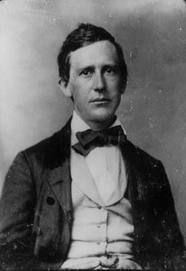Annotation:O! Susanna: Difference between revisions
m (Text replacement - "garamond, serif" to "sans-serif") |
No edit summary |
||
| (One intermediate revision by the same user not shown) | |||
| Line 1: | Line 1: | ||
---------- | |||
---- | {{TuneAnnotation | ||
|f_tune_annotation_title= https://tunearch.org/wiki/Annotation:O!_Susanna > | |||
'''OH SUSANNA(H).''' American (originally); Song Tune. English, Morris Dance Tune (6/8 time). G Major. Standard tuning (fiddle). AB. The original version was written by songwriter by Stephen Foster and became one of his most popular songs. It was first published in 1848, although it was written the year before, when Foster was resident in Cincinnati, Ohio (possibly for his men's social club). It was cited as commonly played for Orange County, New York country dances in the 1930's (Lettie Osborn, '''New York Folklore Quarterly''') and was imported overseas where a jig version was used as a tune for a single step dance in the North-West England morris dance tradition. Richardson (1927, 1955) thinks the tune is the ancestor to "[[Bile Them Cabbage Down]]", which Bayard (1981) lukewarmly "supposes" is possible. Raymond Francois (1990) sees resemblance between Foster's melody and the popular Cajun tune "[[J'etais au Bal]]." Luther Davis, a fiddler from Galax, Va., had a version of the tune he often played. | |f_annotation=[[File:foste.jpg|200px|thumb|right|Stephen Foster (1826–1864)]]'''OH SUSANNA(H).''' AKA - "[[Susanne Don't You Cry]]." American (originally); Song Tune. English, Morris Dance Tune (6/8 time). G Major. Standard tuning (fiddle). AB. The original version was written by songwriter by Stephen Foster and became one of his most popular songs. It was first published in 1848, although it was written the year before, when Foster was resident in Cincinnati, Ohio (possibly for his men's social club). It was cited as commonly played for Orange County, New York country dances in the 1930's (Lettie Osborn, '''New York Folklore Quarterly''') and was imported overseas where a jig version was used as a tune for a single step dance in the North-West England morris dance tradition. Richardson (1927, 1955) thinks the tune is the ancestor to "[[Bile Them Cabbage Down]]", which Bayard (1981) lukewarmly "supposes" is possible. Raymond Francois (1990) sees resemblance between Foster's melody and the popular Cajun tune "[[J'etais au Bal]]." Luther Davis, a fiddler from Galax, Va., had a version of the tune he often played. | ||
<br> | <br> | ||
<br> | <br> | ||
Foster's songs enjoyed international popularity. "Oh Susanna," for example, can be found in the 1850 music manuscript collection (p. 68) of shoemaker and fiddler William Winters (West Bagborough, Somerset, southwest England) | |||
|f_source_for_notated_version=Rev. Luke Donnellan music manuscript collection [O'Connor]. | |||
|f_printed_sources=Chaff ('''Complete Preceptor for the Banjo'''), 1851; p. 4. O'Connor ('''The Rose in the Gap'''), 2018; No. 5, p. 142 (as "Susanne, Don't You Cry"). Sweet ('''Fifer's Delight'''), 1965/1981; p. 9. Wade ('''Mally's North West Morris Book'''), 1988; p. 21. | |||
|f_recorded_sources=Victor 36400A (78 RPM), Woodhull's Old Tyme Masters (N.Y.) (1941). | |||
|f_see_also_listing= | |||
}} | |||
------------- | |||
---- | |||
Latest revision as of 03:35, 29 June 2023
X:1 T:O! Susanna M:2/4 L:1/8 R:Song Air B:Gumbo Chaff - The Complete Preceptor for the Banjo (1851, p. 4) N: A later edition of the earliest known banjo tutor, published in 1848. It was written by Elias Howe, whose pseudonym Gumbo Chaff N:is taken from Thomas Dartmouth Rice's 1834 blackface character. The 1851 edition was published in Boston by Oliver Ditson. N:In 1850 Howe sold some of his works to Ditson (this one among them) and agreed not to publish similar works for ten years. Z:AK/FIddler's Companion K:D d/e/|fa ab|af d>e|ff ed|e3 d/e/|fa ab|af de|ff ee|d3|| g2g2|b b2b|aa fd|e3 d/e/|fa ab|af de|ff ee|d3:|]

Foster's songs enjoyed international popularity. "Oh Susanna," for example, can be found in the 1850 music manuscript collection (p. 68) of shoemaker and fiddler William Winters (West Bagborough, Somerset, southwest England)

